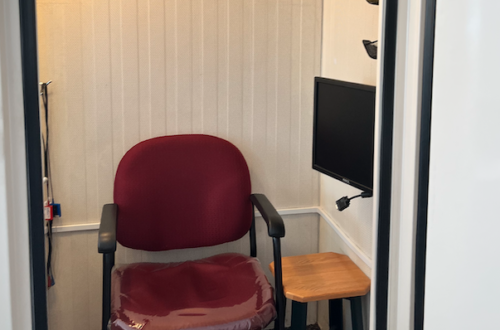
Choosing a Patient Advocate; Who Should It Be?
We here at Decipher Your Health frequently discuss having someone with you as a patient advocate when seeking medical care. But we haven’t addressed who that patient advocate should be and in what capacity. Let’s fix that!
Who are patient advocates?
Generally, when we speak of patient advocates, we are talking about someone who will help you navigate an emergency department (ED) visit or a primary care provider (PCP) appointment. They could be a family member or a friend, anyone you feel comfortable with and who is willing to help you. This person is typically not being tasked to make life-or-death decisions on your behalf, but to help you while you’re not at your best.

However, there are also official patient advocates who can have legal standing in your care. This type of patient advocate is someone you have legally designated as your Medical Power of Attorney to make decisions on your behalf should you be unable to do so on your own. If you have not designated a patient advocate, or surrogate decision-maker, in an emergency, the hospital will default to the next of kin, as specified by the state’s priority order. Generally, this starts with a spouse or legal partner, followed by an adult child, a parent, and then a sibling. Depending on the situation and state, close friends may also be asked if necessary. Oftentimes, staff may rapidly look for the “emergency contact” listed in your electronic health record demographic information. (Consider looking up in your chart who you have listed as your emergency contact when you finish this article!)
State rules vary, so if you want to name a patient advocate, you must find out how this is done where you live. Remember, the patient advocate’s decisions only apply if you can NO longer make decisions for yourself.
Choosing a patient advocate, from someone who has been there
Recently, Karin and I did a presentation for Sepsis Alliance Connect, the virtual support site for Sepsis Alliance. The topic was what to expect when you go to an emergency department or urgent care clinic. And, as usual, we talked about having a patient advocate.
Norma Bridgen-Sandor, a septic shock survivor, was an active audience member. She offered her thoughts and observations in the chat box as Karin and I spoke. Norma shared with us how she advises others as they make decisions about patient advocates. We’re sharing them here with her permission gleaned from her experience, along with some of our own tips.
For the patient advocate who attends appointments or the ED with you
How does the person deal with emergencies?
It might be natural to ask a spouse or close friend to act as your patient advocate, but how does that person react when facing an emergency? Can they deal with stressful situations? Many people are great with theoretical situations but may faint at seeing an injection or the sight of blood. Can they deal with fast-paced situations where they may have to ask questions or stand their ground?
Does the person have a medical background?
Having a medical background isn’t essential, but it can be helpful in helping your advocate understand the situation and ask appropriate questions when needed.
Does the person know your health information, like what you’re allergic to?
In emergencies or if you’re just feeling too awful, it’s not unusual that you might forget to tell the staff some details, like allergies, past surgeries or bad reactions to medications or treatments. (Which is also one of the reasons you may hear staff members ask you the same questions again and again.)
Can the person take good notes?
Taking good notes is important during an appointment. Can your advocate make accurate notes about what the healthcare professionals say, including names of the healthcare team, test results and their significance, medications, signs and symptoms to prompt an emergent, urgent or routine return to the doctor and plans for follow up.
Can they ask pertinent questions?
Your advocate’s primary role is to be a supporting presence; sometimes this includes asking questions if you are unable or haven’t thought of them. Can they think of these things and speak up if and when needed? Can they prepare you prior to the appointment (or while you are in the ED waiting room) to find out what are the most important issues you would like addressed?
Are they aware of resources and obstacles at home?
Does the person know what you can afford in case you need to purchase extra items? And do they know your living situation? For example, how will you get in if you’ve broken a leg but have stairs to access your home? How will you eat if you’re too weak to prepare your meals but live alone? If you’re a caregiver to someone else, who will take over?
Choosing a legal patient advocate
There are other issues to consider when choosing someone who may have to make life-or-death decisions, starting with, does that person want the responsibility? You must discuss this with someone before designating them as your advocate.
Is the person easily reachable, or are they frequently unavailable? Can they drop what they’re doing to join you in the emergency department?
If you name someone as an advocate who cannot be reached, this can cause delays in your care. Your adult child may be a great patient advocate when they are with you, but if they live on the other side of the country, can they communicate effectively with the hospital staff?
Do they know your wishes?
Have you had discussions regarding your health and treatment goals with your patient advocate? What do you want? For example, If you have a do-not-resuscitate order, are they aware of that? Do they know if you are an organ donor in case of a catastrophic accident? Do you have religious beliefs that strongly guide your care like not accepting any blood products?
Can they weigh out the life decisions to be made?
Not everyone is comfortable making serious life decisions, like deciding if surgery is right for you or no heroic measures should be performed if your heart were to stop. Having these difficult discussions ahead of time with your patient advocate can put both of you at ease. In his short best-selling book, Being Mortal, Dr. Atul Gawande explored these issues with his own father, and despite their shared background as physicians, they discovered that they needed to clarify his father’s goals.
Do they have good communication skills and are willing and able to contact close family members with updates?

When someone is admitted to the hospital, information may only be given to designated people – in this case, it likely would be the patient advocate. Unfortunately, sometimes friends and family will still try to contact the hospital to ask questions and get updates. This can overwhelm the staff because they can’t focus on caring for their patients. One role of the patient advocate is to get the information and send it along to the appropriate people. Alternatively, if you are very private and don’t want your information shared, can the person representing you be trusted to abide by your wishes?
Being prepared before any emergency or health crisis occurs is the best thing you can do for yourself and those who care about you. Now take that first step, log on to your patient portal and verify who is your emergency contact.
Disclaimer
The information in this blog is provided as an information and educational resource only. It is not to be used or relied upon for diagnostic or treatment purposes.
The blog does not represent or guarantee that its information is applicable to a specific patient’s care or treatment. The educational content in this blog is not to be interpreted as medical advice from any of the authors or contributors. It is not to be used as a substitute for treatment or advice from a practicing physician or other healthcare professional.



